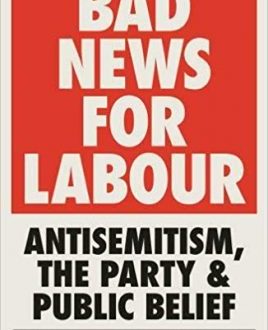This is a cross post by Dave Rich from The CST Blog
Yesterday’s Guardian included a very good article by Tanya Gold regarding antisemitic discourse and the recent incident of a Nazi-themed drinking game on a London School of Economics ski trip, which resulted in a Jewish participant in the trip having his nose broken after objecting to the game.
Predictably, because the article argued that some attacks on Israel and its supporters have their roots in antisemitism or are themselves antisemitic, today’s Guardian carries a series of letters objecting.
One of the letters, from an LSE alumnus, condemns the ski trip incident but then states:
My own Jewish nostrils are very sensitive to any whiff of antisemitism and I never smelled even a hint of it during my LSE years.
To which I can only say, “lucky you!”. When I studied at LSE the Student Union anti-racism officer banned the Jewish Society from participating in ‘anti-racism week’, on the grounds that they were Zionists and therefore themselves racists. It didn’t take “Jewish nostrils” to detect the antisemitic stench in that act.
Another letter was from Karl Sabbah, who wrote:
Once again a Jewish writer (Tanya Gold, 17 January) complaining about antisemitism deliberately ignores the distinction between false accusations against Jews over the centuries and justified criticism of the Jewish takeover of Palestine, a land that in living memory had a population that was 90% Arab, including my grandparents. Should the victim of a crime keep quiet because false accusations have been made against the criminal in the past? Let it be said loud and clear – it is entirely possible to criticise Israel without being antisemitic. To deny this is to argue against freedom of speech.
Sabbagh is right: it is entirely possible to criticise Israel without being antisemitic. The way to do this is to make a political argument criticising the policies of the Israeli government, as you would any other. The wrong approach would be to criticise those policies on the basis of Israel’s Jewishness – ‘they act that way because they are Jews’ – or to use criticisms of Israeli policy as the basis of a critique of Jews and Jewishness generally. Down that road lies, well, antisemitism.
Why am I not surprised to find that Sabbagh has in the past been guilty of doing both these things? He has even argued that the Israel-Palestine conflict will not end until “there is no such thing as a Jew”.
Funnily enough, the first example comes from a letter by Sabbagh published on theGuardian letters page during the conflict between Israel and Hamas in Gaza and southern Israel in January 2009. After condemning Israeli actions and the way they were reported in the media, Sabbagh then asked:
What has happened to the much-vaunted “civilised values” Jews and their religion are supposed to have brought to the world? Why are so many Jews, and particularly Israelis, not more ashamed of what is being done in their name?
More recently, Sabbagh contributed a recommendation to the back cover of Gilad Atzmon’s latest book, The Wandering Who? A Study of Jewish Identity Politics:
The Wandering Who? is as witty and thought provoking as its title. But it is also an important book, presenting conclusions about Jews, Jewishness and Judaism which some will find shocking but which are essential to an understanding of Jewish identity politics and the role they play on the world stage.
We have written about Atzmon’s book previously, here and here. We described it as “quite probably the most antisemitic book published in this country in recent years”, a judgement we stand by. Atzmon attacks “Jewishness”; praises what he calls “Jewish self-haters”; claims the credit crunch was a Jewish conspiracy; and argues that in the future people might think Hitler was right about the Jews. He even cracks Jewish jokes which are not that witty, whatever Sabbagh thinks.
In a public meeting to promote the book, Sabbagh explained why he contributed this approbation:
When people write words which are put on the back of books and then are attacked for defending the books, the usual response is to say “Well I don’t agree with everything in the book but I defend this man’s right to write it.” I’ve written something on the back of this book and it’s not so much I don’t agree with everything in it; I agree with everything in it that I can understand, but there’s an awful lot that I can’t because I’m not a philosopher, but I’m very impressed by the depth of scholarship in this book”.
On the particular question of Jewish identity and its relation to the Israel-Palestine dispute, Sabbagh endorsed Atzmon’s critique of Jewish identity as a negative force and made the astonishing claim that there will not be peace until “there is no such thing as a Jew”:
I think the question of Jewish identity is related to the question of how people understand the Israel-Palestine situation, and if the inconsistencies can be exposed by writing like Gilad’s to the point where actually there is no such thing as a Jew other than somebody who’s not defined as anything else, then it might help to break the solid wall of pro-Israeli feeling that there is in the world and help some kind of solution to come about that is not happening at the moment.”
As Tanya Gold wrote in the Guardian:
Antisemitic discourse is now mainstream and to say it all comes from the crimes of the Jewish state feels disingenuous and a denial of the past. Antisemitism is too old to sprout anew from nothing.
I couldn’t have put it better myself.


